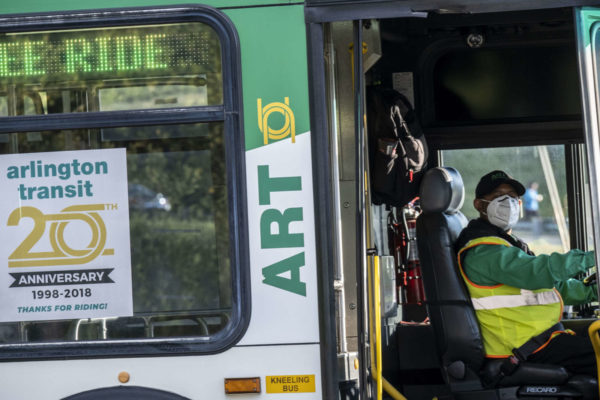
(Updated 6:15 p.m. on 02/16/22) For the next 18 months, bus fare will be free or reduced-price for thousands of income-eligible residents and students.
The fare reductions began this month as part of the Low-Income Fare Assistance and the APS Student Fare-Less pilot programs, which are intended to target residents most impacted by the pandemic.
The Arlington County Board signed off on these programs in November as part of a spending plan for $29.5 million in American Rescue Plan Act dollars that apportioned funding for a host of new equity initiatives. These two programs will use about $2.8 million in ARPA funds.
The first provides free transit to work for residents currently enrolled in the Supplemental Nutrition Assistance (SNAP) and Temporary Assistance for Needy Families (TANF) programs, run by the Department of Human Services. The department will distribute pre-paid SmarTrip cards worth $150, or 75 rides, to about 7,200 pre-identified residents.
This program is expected to cost $1.2 million in this fiscal year, ending in June, and $250,000 next year.
Meanwhile, the student pilot program subsidizes the currently discounted, $1-a-trip student iRide card for certain students traveling to and from school.
Arlington Public Schools will distribute these cards to up to 2,400 middle and high school students who aren’t well-served by school bus services — such as kids who live at the edges of a large walk zone or attend programs far from home. These cards will be loaded with $10 a week over the course of 18 months.
The program will cost $479,000 in this fiscal year and $878,000 next year. It continues and expands on a pilot program that began in 2019 but was suspended during the pandemic.
Participants in both programs have 18 months to use their cards, which also work on Metrobus and Metrorail lines.
Department of Environmental Services staff will use data from these pilots to inform possible expansions or changes to these programs long term. This work could be funded by a Virginia Department of Rail & Public Transportation’s TRIP grant, intended to increase regional connectivity and reduce barriers to transit by supporting low-income and free fare programs.
“The County is interested in applying for a TRIP grant in the future, and would use the data collected from the 18-month pilot programs and results from the fare study to support such an application,” DES spokesman Nate Graham said.
Meanwhile, transportation staff are taking steps now to understand how existing free and reduced-fare policies at peer transportation departments impact ridership, operations and regional services such as Metrobus, he said.
Last week, the county requested funding from DPRT for a study that would analyze these questions, as well as equity concerns and stakeholder feedback, he said. The county should know if it received the grant in June.
Arlington promoted these new initiatives on Friday, Rosa Parks’ birthday and “Transit Equity Day.” It honors her legacy as a Civil Rights activist. Parks, who took a stand for desegregated bus seating, sparked the Montgomery bus boycott and a U.S. Supreme Court decision declaring segregation on buses unconstitutional.
“These two pilot programs help to further the mission of Realizing Arlington’s Commitment to Equity (RACE), which includes advancing racial equity to reduce and prevent disparities in our service to the community,” said Chief Race and Equity Officer Samia Byrd in a statement. “Even though no longer unequal by law, systemic barriers still exist.”
“Our review of transit through an equity lens is to consider access based on need (meeting people where they are) and work to remove those barriers,” Byrd continued. “Through this we aim to honor the legacy of Rosa Parks — equal treatment and equitable access to public transportation for everyone.”
ART bus fare was suspended for all users from March 2020 until January 2021 due to the pandemic.

